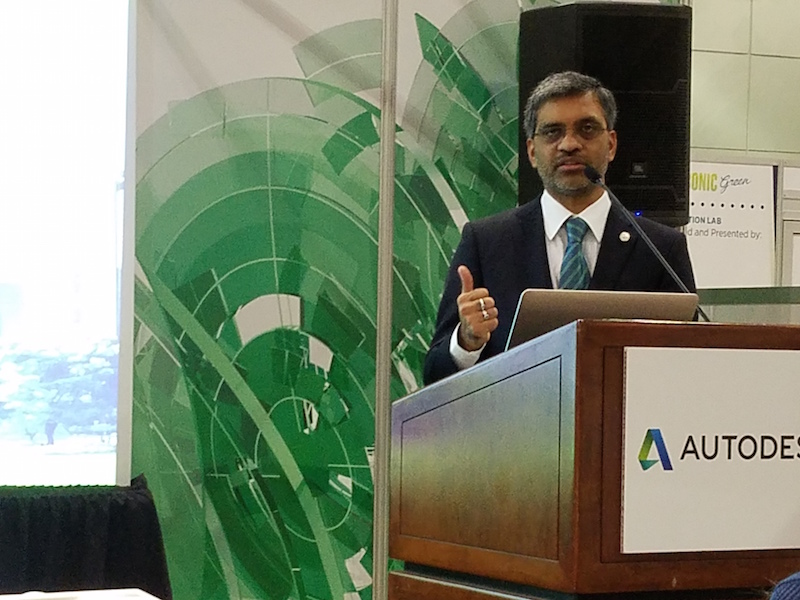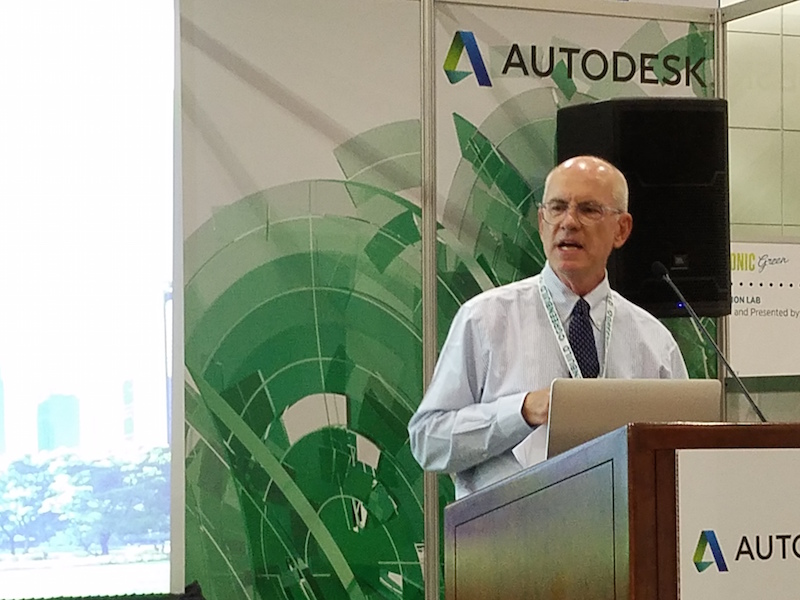A new software program that’s been more than five years in the making addresses one of the missing pieces in LEED certification—quantifying the value of going through the process.
At the Greenbuild convention in Los Angeles on Wednesday, Impact Infrastructure, a New York-based software supplier; and Autodesk, an investor in that company, introduced a beta version of Autocase for Sustainable Buildings, a web- and research-based software tool that can show building owners and their AEC teams the financial, social, and environmental returns from green strategies and practices, all in real time.
In addition, the U.S. Green Building Council (USGBC) has created a pilot credit under LEED v.4, called “Informing Design Using Triple Bottom Line Analysis,” that awards cost-benefit evaluations using Autocase that help users determine solutions for optimal returns from earning LEED points.
“What is the value of being green?” asked Mahesh Ramanujam, COO and incoming CEO of USGBC, during the press conference. He answered his own question by pointing out that in a nonresidential sector averse to sharing data, Autocase provides a much-needed measuring stick that is simple and affordable to use, and is informed by LEED’s vision.
Ramanujam framed Autocase as giving more ammunition to users that are weighing the pros and cons of LEED certification, at a time when LEED finds itself competing with several other certification programs, some of which are more focused on wellness and post-occupancy comfort and efficiency. Ramanujam suggested as well that Autocase “raises the bar” for any subsequent versions of LEED.
John Williams, CEO of Impact Infrastructure, recounted how his company and its strategic partners, which include the third-party certifier Green Business Certification Inc. (GBCI), had been working on this tool since the beginning of this decade. Early versions were too expensive, so Impact Infrastructure went back to the drawing board to refine the software so that it was not only more affordable to a broader customer base, but also much quicker to use.
“What would have cost $250,000 for a custom analysis now costs virtually nothing,” he said. “We’re filling the gap and showing value.” And an analysis that would have taken months to complete is now automated with a few keystrokes for speedy information delivery.
Ryan Meyers, Impact’s Chief Technology Officer, and the principal architect of Autocase, gave a brief demonstration of the product, showing how users plug in their own market-specific data, which Autocase applies to its analysis for calculating the savings for owners, occupants, and other stakeholders, based on a raft of existing research and case studies.
Much like Turbo Tax, Autocase has an icon at the top of its home page that tells uses how much they gain from green building. For example, if you want to know the value of sustainable water practices or how green building benefits the long-term health of occupants, Autocase can provide a dollar estimate that changes as new data are introduced.

Mahesh Ramanujam, the incoming CEO of the U.S. Green Building Council, which created a pilot credit in LEED certtification for analyses that derive from Autocase software. Image: BD+C
For Johns Hopkins University’s Sustainable Campus Initiative LEED Existing Buildings certification, Autocase was used to analyze energy and water conversation practices—such as efficient lighting, heat recovery, and graywater systems—and prioritized investments in order to build a case that was used to get budgetary approval.
Dewberry is using this tool for the renovation of its corporate headquarters, said Lidia Berger, MEM, LEED Fellow, LEED AP BD+C, LEED O+M, the engineering firm’s sustainability director.
Sometime in the first quarter of 2017, Impact Infrastructure plans to release a production version of Autocase, along with a similar tool for analyzing and quantifying green infrastructure practices, said Meyers.
Related Stories
| Aug 11, 2010
NoricF4 custom metal ICF frames receive fire ratings, comply with antiterrorism standards for buildings
Reward Wall Systems' NoricF4 Custom Metal ICF Frames have received fire ratings of 1.5 hours to 3 hours and they have been evaluated to be in compliance with the prescriptive requirements of the Department of Defense Minimum Antiterrorism Standards for Buildings for blast/force protection.
| Aug 11, 2010
Nation's first set of green building model codes and standards announced
The International Code Council (ICC), the American Society of Heating, Refrigerating and Air Conditioning Engineers (ASHRAE), the U.S. Green Building Council (USGBC), and the Illuminating Engineering Society of North America (IES) announce the launch of the International Green Construction Code (IGCC), representing the merger of two national efforts to develop adoptable and enforceable green building codes.
| Aug 11, 2010
Earthquake engineering keeps airport grounded
Istanbul, Turkey's new 2.15 million-sf Sabiha Gökçen International Airport opened on October 31, 2009, becoming the world's largest seismically isolated building. Arup's global airport planning and engineering team, in collaboration with architects Dogan Tekeli Sami Sisa Mimarlik Ofisi and contractor LIMAK-GMR JV, working within an 18-month timeline, designed and built the facility wi...
| Aug 11, 2010
New Ways to Improve Water Efficiency
In the U.S. and most of the industrialized world, building occupants take for granted the simple convenience of filling a glass with clean, drinkable water at the kitchen sink. Yet worldwide, nearly a billion people globally have no access to safe drinking water, according to the Natural Resources Defense Council.
| Aug 11, 2010
Embassy's dual façades add security and beauty
The British government's new 46,285-sf embassy building in Warsaw, Poland's diplomatic quarter houses the ambassador's offices, the consulate, and visa services on three floors. The $20 million Modernist design by London-based Tony Fretton Architects features a double façade—an inner concrete super structure and an outer curtain wall.
| Aug 11, 2010
Cost of HVAC equipment to remain flat in 2009, says Turner
While some manufacturers have announced slight increases in facilities equipment pricing for 2009, the average cost of equipment is expected to remain flat in 2009, according to the 2009 Turner Logistics Equipment Cost Index. However, equipment pricing could face increased pressure if there is a further decline in market demand.
| Aug 11, 2010
Toronto mandates green roofs
The city of Toronto late last month passed a new green roof by-law that consists of a green roof construction standard and a mandatory requirement for green roofs on all classes of new buildings. The by-law requires up to 50% green roof coverage on multi-unit residential dwellings over six stories, schools, nonprofit housing, and commercial and industrial buildings.
| Aug 11, 2010
Robotic storage facility protects exotic automobiles, fine wines, artwork
Miller Construction Company, Fort Lauderdale, Fla., has completed construction on a high-tech robotic storage facility designed to store and protect valued possessions such as exotic automobiles, fine wines, artwork, and jewelry. Designed and built to resist Category 5 hurricanes, the RoboVault facility features automated storage retrieval, biometric recognition, private access with 24/7 securi...
| Aug 11, 2010
7 Tips for Installing Moisture Barriers
If you took a poll of building envelope and construction forensic experts, it's likely that moisture barriers would be high on the list of most poorly understood products used in wall assemblies. Besides deciding which type of barrier to use under various climate conditions, Building Teams must confront the nasty matter of how to install them correctly.







